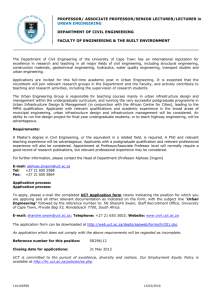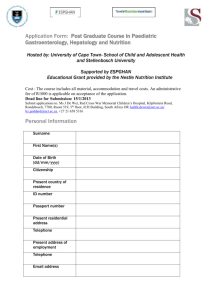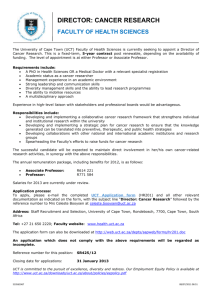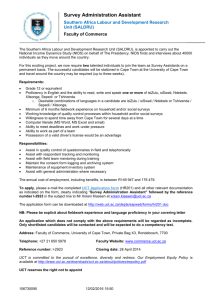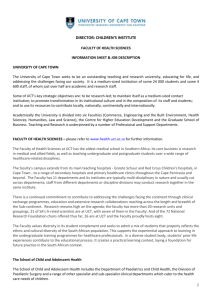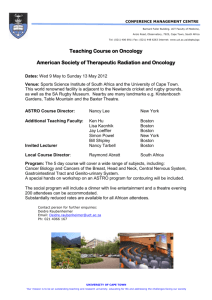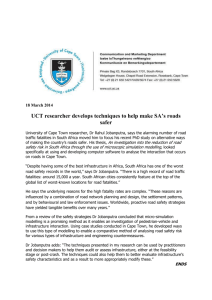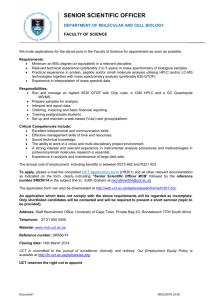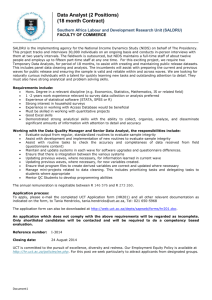Raymond (Bill) Hoffenberg
advertisement
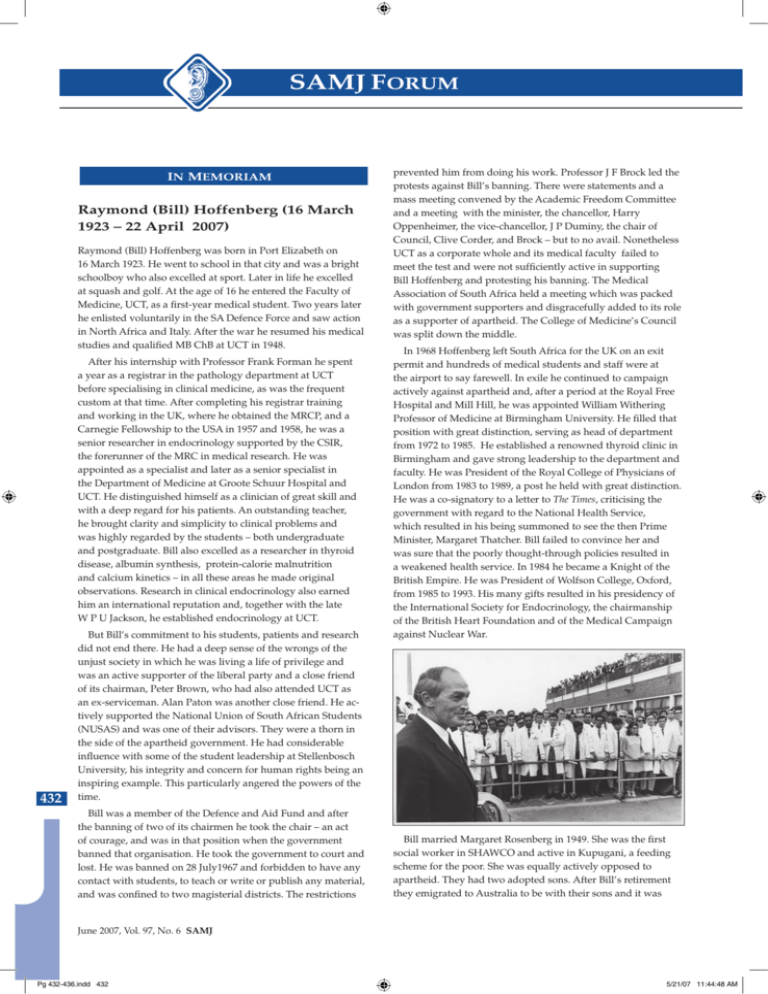
SAMJ FORUM IN MEMORIAM Raymond (Bill) Hoffenberg (16 March 1923 – 22 April 2007) Raymond (Bill) Hoffenberg was born in Port Elizabeth on 16 March 1923. He went to school in that city and was a bright schoolboy who also excelled at sport. Later in life he excelled at squash and golf. At the age of 16 he entered the Faculty of Medicine, UCT, as a first-year medical student. Two years later he enlisted voluntarily in the SA Defence Force and saw action in North Africa and Italy. After the war he resumed his medical studies and qualified MB ChB at UCT in 1948. After his internship with Professor Frank Forman he spent a year as a registrar in the pathology department at UCT before specialising in clinical medicine, as was the frequent custom at that time. After completing his registrar training and working in the UK, where he obtained the MRCP, and a Carnegie Fellowship to the USA in 1957 and 1958, he was a senior researcher in endocrinology supported by the CSIR, the forerunner of the MRC in medical research. He was appointed as a specialist and later as a senior specialist in the Department of Medicine at Groote Schuur Hospital and UCT. He distinguished himself as a clinician of great skill and with a deep regard for his patients. An outstanding teacher, he brought clarity and simplicity to clinical problems and was highly regarded by the students – both undergraduate and postgraduate. Bill also excelled as a researcher in thyroid disease, albumin synthesis, protein-calorie malnutrition and calcium kinetics – in all these areas he made original observations. Research in clinical endocrinology also earned him an international reputation and, together with the late W P U Jackson, he established endocrinology at UCT. 432 But Bill’s commitment to his students, patients and research did not end there. He had a deep sense of the wrongs of the unjust society in which he was living a life of privilege and was an active supporter of the liberal party and a close friend of its chairman, Peter Brown, who had also attended UCT as an ex-serviceman. Alan Paton was another close friend. He actively supported the National Union of South African Students (NUSAS) and was one of their advisors. They were a thorn in the side of the apartheid government. He had considerable influence with some of the student leadership at Stellenbosch University, his integrity and concern for human rights being an inspiring example. This particularly angered the powers of the time. Bill was a member of the Defence and Aid Fund and after the banning of two of its chairmen he took the chair – an act of courage, and was in that position when the government banned that organisation. He took the government to court and lost. He was banned on 28 July1967 and forbidden to have any contact with students, to teach or write or publish any material, and was confined to two magisterial districts. The restrictions prevented him from doing his work. Professor J F Brock led the protests against Bill’s banning. There were statements and a mass meeting convened by the Academic Freedom Committee and a meeting with the minister, the chancellor, Harry Oppenheimer, the vice-chancellor, J P Duminy, the chair of Council, Clive Corder, and Brock – but to no avail. Nonetheless UCT as a corporate whole and its medical faculty failed to meet the test and were not sufficiently active in supporting Bill Hoffenberg and protesting his banning. The Medical Association of South Africa held a meeting which was packed with government supporters and disgracefully added to its role as a supporter of apartheid. The College of Medicine’s Council was split down the middle. In 1968 Hoffenberg left South Africa for the UK on an exit permit and hundreds of medical students and staff were at the airport to say farewell. In exile he continued to campaign actively against apartheid and, after a period at the Royal Free Hospital and Mill Hill, he was appointed William Withering Professor of Medicine at Birmingham University. He filled that position with great distinction, serving as head of department from 1972 to 1985. He established a renowned thyroid clinic in Birmingham and gave strong leadership to the department and faculty. He was President of the Royal College of Physicians of London from 1983 to 1989, a post he held with great distinction. He was a co-signatory to a letter to The Times, criticising the government with regard to the National Health Service, which resulted in his being summoned to see the then Prime Minister, Margaret Thatcher. Bill failed to convince her and was sure that the poorly thought-through policies resulted in a weakened health service. In 1984 he became a Knight of the British Empire. He was President of Wolfson College, Oxford, from 1985 to 1993. His many gifts resulted in his presidency of the International Society for Endocrinology, the chairmanship of the British Heart Foundation and of the Medical Campaign against Nuclear War. Bill married Margaret Rosenberg in 1949. She was the first social worker in SHAWCO and active in Kupugani, a feeding scheme for the poor. She was equally actively opposed to apartheid. They had two adopted sons. After Bill’s retirement they emigrated to Australia to be with their sons and it was June 2007, Vol. 97, No. 6 SAMJ Pg 432-436.indd 432 5/21/07 11:44:48 AM SAMJ FORUM there that Margaret died in 2005. Bill was professor of medical ethics at the University of Queensland until 1995. He married Madeleine Douglas in 2006. He died on 22 April 2007. Just over a month before he died Bill visited South Africa for the last time and met with a small number of friends, particularly those who served with him in the Defence and Aid Fund. He had returned after 1994 and had advised the new SA government on several aspects of health care. He had helped the health minister, Dr Zuma, during her exile and had been Oliver Tambo’s personal physician. Bill was a great South African and an outstanding human being. Those who had the privilege of knowing him will remember his style, his wit, and his warmth. South Africa and our profession were enriched by the life of this gifted man. Emeritus Professor Stuart J Saunders Raymond Hoffenberg, universally known as Bill, was born in Port Elizabeth in 1923. He was schooled at Grey High School and after matriculating at 16 years of age proceeded to study medicine at the University of Cape Town where he was one of a number of students who interrupted their studies to serve in the Armed Forces in North Africa and Italy. Bill graduated MB ChB in 1948, was intern to Professor Frank Forman, spent a year in the UCT Department of Pathology and, after a spell of postgraduate training in internal medicine in England, rejoined the Forman firm where he rapidly progressed from registrar to senior consultant. Bill Hoffenberg was one of a small group of truly great general physicians able at the same time to become an internationally recognised endocrinologist and an outstanding basic science researcher. Together with Professor W P U Jackson, Bill established an endocrine clinic at Groote Schuur Hospital and trained a large number of endocrinologists, many of whom have gained international recognition in this field. In the laboratory his work was influenced by Professor John Brock who was arguably the father of clinical research in South Africa. Bill's work on albumin metabolism in kwashiorkor is still quoted more than 30 years after it was first published. His ability to put his work into writing was legendary. Colleagues recall Bill writing a paper on albumin synthesis in long hand over a single lunch hour. The paper was duly typed, immediately mailed and appeared unchanged 6 weeks later in Nature. 434 Bill Hoffenberg was one of UCT’s most popular teachers. He was able to distil his deep knowledge of his subject and to lace this with humour so that what he taught was fixed forever in the minds of his students. Thus he would illustrate myxoedema by reading from Cronin’s The Citadel and thyroid eye disease using the comic character Evil-eyed Fleegle of Little Abner fame. These descriptions were vividly recalled at a recent 40year class reunion. Generations of students admired Hoffenberg as a role model. His respect for his fellow human beings, his courteous, friendly and warm approach to his colleagues, students and patients regardless of their race, colour or creed, were an inspiration to many. Bill Hoffenberg was a totally committed opponent of apartheid. In 1953 he joined the Liberal Party of South Africa, which opposed racist policies and the abrogation of human rights under the National Party Government. In 1963 he mounted a campaign against solitary confinement. He was an active advisor to various student groups such as NUSAS, and was Chairman of the Defence and Aid Fund, a movement which provided funds for the defence of persons charged with political offences. It was banned in 1966. In 1965 his passport was withdrawn and during 1966 his application to the International Atomic Energy Agency for research funding was mysteriously delayed in Pretoria. On Friday 28 July 1967 Bill Hoffenberg was served with a banning notice confining him to the Cape Peninsula, prohibiting him from attending gatherings and terminating his teaching at the University of Cape Town Medical School from the end of the academic year. The Department of Medicine reacted vigorously in an attempt to have this senseless order set aside. Professor Brock in particular was totally committed to proving Bill's innocence. The registrars in the department offered Brock their resignation to use at his discretion. Several consultants undertook to see that a letter to the editor appeared each day in the Cape Times. Frances Ames, Bernard Pimstone, Hymie Gordon, Reuben Mibashan, Jim McGregor and Stuart Saunders were particularly supportive. While the rest of the university joined the Department of Medicine in their attempts to have the ban set aside, this commitment to a much-loved and respected colleague was notably lacking in the hospital and in some of the other departments in the Medical School. Neither the then Dean nor the Chief Superintendent of Groote Schuur Hospital made any attempt to contact Bill after he had been served with the banning orders, not even to thank him for more than 25 years of service. The Colleges of Medicine of South Africa decided not to react while the Medical Association of South Africa supported the banning order. The University Council reacted strongly against the banning, as did the academic staff, the SRC and NUSAS. Finally, after a delegation consisting of the Chancellor, Mr Harry Oppenheimer, the Chairman of Council, Mr Clive Corder, the Vice-Chancellor, Dr J P Duminy, and Professor Brock had failed to influence the Minister, Brock wrote an article in the Cape Times, 4 November 1967, challenging the banning. He concluded: ‘The whole matter represents a sorry story which should make all South Africans hang their heads in shame. I am more concerned with the conscience of South Africa than for Dr Hoffenberg, whose gifts and values are fully recognised overseas. I and my department lose a brilliant colleague. Who June 2007, Vol. 97, No. 6 SAMJ Pg 432-436.indd 434 5/21/07 11:44:48 AM SAMJ FORUM knows how many brains will be added to the drain which has been accelerated by the Minister's decision? On 28 March 1968 Bill Hoffenberg, his wife Margaret (a former SHAWCO social worker) and their sons, Peter and Derek, left D F Malan airport en route to England. More than a thousand students and staff members of the University of Cape Town crowded into Jameson Hall to pay tribute to Bill Hoffenberg. Before the lunch hour meeting students carrying placards stood in silence outside the hall. One placard read: ‘There used to be justice in South Africa.’ The meeting was addressed by Brock and by the president of the SRC. Five buses and about five hundred cars transported students and staff to D F Malan airport. Medical students in white coats lined up on the lawns behind the tarmac fence. Others gathered on the upstairs balcony and in the foyer. Many of the students and staff were in full academic dress. At 14h30 Bill Hoffenberg arrived at the airport. He proceeded slowly through the foyer greeting his students, colleagues and friends. As he reached the doors leading onto the tarmac Professor Forman darted forward, took his arm and, as if to shield his former student from the police who were busy photographing all those who greeted Bill, moved out with him onto the tarmac. The students sang Gaudeamus Igitur and then Die Stem. On the tarmac Bill and Margaret Hoffenberg stood at attention until the anthem had ended. A clergyman in the crowd suddenly shouted: ‘Bill! We will overcome!’ and the crowd spontaneously began singing the banned American civil rights freedom song. At 14h55, the Hoffenbergs boarded the aircraft. The staff and students remained standing in silence until the plane was airborne. When Bill Hoffenberg left Cape Town on 28 March 1968 he had no clinical appointment to go to. It is a tribute to his unique talents that 4 years later he was appointed as the William Withering Professor of Medicine and Head of the Department of Medicine at the University of Birmingham – one of the most prestigious chairs in the UK. Bill was a member of numerous professional societies. Characteristically, he held an office in virtually every one of these. Thus he was a member of the executive committee of the International Society for Endocrinology (1976 - 1986), was elected President of the Royal College of Physicians (1983 - 1989), and President of Wolfson College, Oxford (1985 - 1993). Bill Hoffenberg’s contributions to British medicine were recognised by the award of a knighthood in 1984. He received honorary fellowships from 8 colleges and academies throughout the world, including the Colleges of Medicine of South Africa, and honorary doctorates from 4 universities including a DSc Med from his alma mater, the University of Cape Town (1993), from which he had already earned both an MD (1957) and a PhD (1968). After his retirement from Wolfson College he moved to Australia where he was Professor of Medical Ethics at the University of Queensland for 2 years. He was president of the Medical Campaign Against Nuclear Weapons which in 1992 evolved into the charity Medact, of which he was a vicepresident until his death. The Times described Bill as ‘tall with a large, strong physique and a graceful stride. His physical energy enabled him to enjoy many forms of recreation, and also gave him the strength that led to the achievement of intellectual and philosophical goals. He was charming, approachable and a good listener.’ In 1949 Bill married Margaret Rosenberg. Lady Margaret Hoffenberg died in 2005. In 2006 Bill married Madeleine Douglas. He is survived by his wife and 2 sons Peter and Derek. The phrase umntu, ngumntu, ngabantu is a central tenant of our African philosophy. Roughly translated it means: a person is a person through other people. It tells us that our humanity is determined through our relationships with our fellow beings. Very few South African physicians have demonstrated their commitment to their fellow beings better than Bill Hoffenberg. He was an outstanding physician, a superb teacher, a distinguished researcher and a person who truly qualified for the description ubuntu. Hamba Kahle Bill! Ralph Kirsch 436 June 2007, Vol. 97, No. 6 SAMJ Pg 432-436.indd 436 5/21/07 11:44:49 AM
